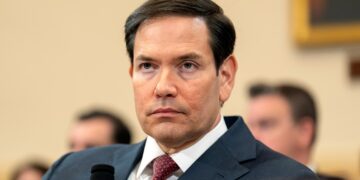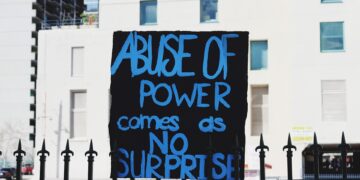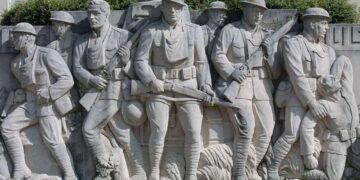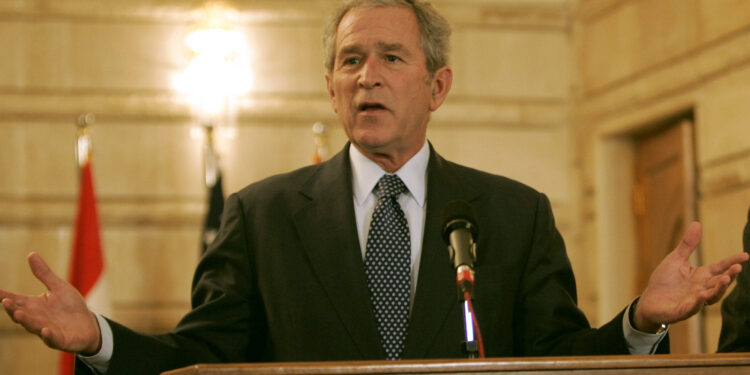The Legacy of the ‘Axis of Evil’
One speech permanently influenced American diplomacy—and not for the better.
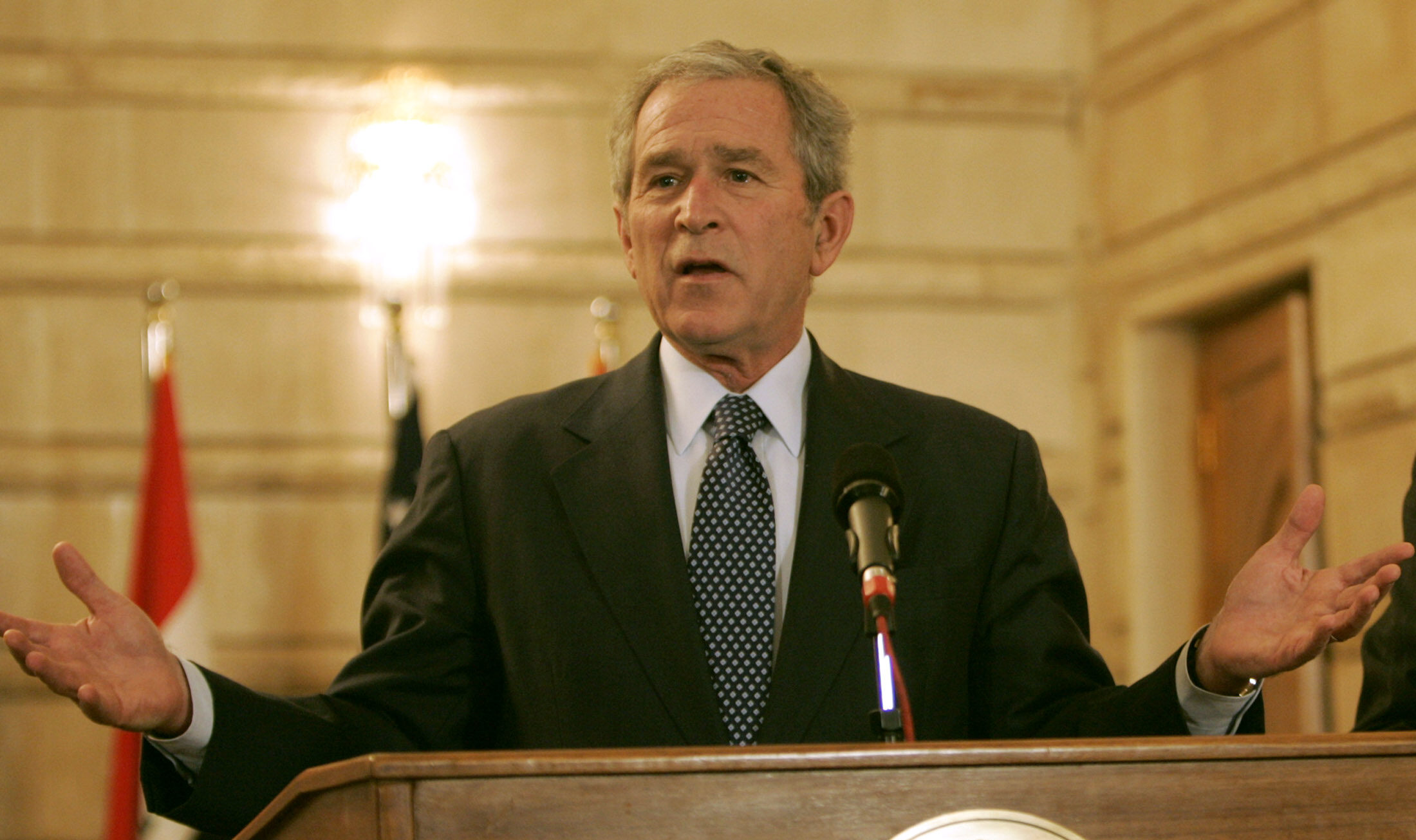
On January 29, 2002, former President George W. Bush delivered the first State of the Union speech after the 9/11 attacks. He listed three countries that he said were involved in the most nefarious activities destabilizing the world by sponsoring terror and threatening America: North Korea, Iran, and Iraq.
“States like these, and their terrorist allies, constitute an axis of evil, arming to threaten the peace of the world,” Bush famously told the Congress and the American people 23 years ago. The speech, written by the Republican commentator and the Atlantic staff writer David Frum, went down in history as one of the most notable State of the Union addresses ever delivered.
In 2014, the Washington Post ranked that speech as the fourth “best state of the union ever” for its importance. “Nobody ever remembers much from State of the Union speeches, but one thing they do remember is the ‘axis of evil’ formulation that President Bush brandished in last year’s address to describe Iraq, Iran and North Korea,” wrote Elisabeth Bumiller of the New York Times in 2003.
At the time, it was broadly agreed that Bush was outlining his plans for conducting the Global War on Terror. He publicly sought to incriminate those countries for orchestrating the 9/11 attacks, or at least of being the driving force behind them. With the invasion of Iraq in 2003, Iran was almost convinced that it would be the next target.
Rumors circulated among Bush advisors, military commanders, as well as media pundits about plans that the administration was developing to strike Iran. In one case, Gen. Wesley Clark, the former supreme allied commander Europe of NATO, said in September 2003 that a senior military officer in Washington, D.C., had told him Bush was planning to attack six Muslim countries after Iraq, including Iran.
Essays about Iran being the next target mushroomed in mainstream publications, and the threat of military action was never off the table until Bush left office in 2009. James Fallows, a former speechwriter for President Jimmy Carter, wrote in the Atlantic in December 2004 that although the question of “will Iran be next” was asked frequently, any military action would eventually bring about a world in which America had to deal with a much more intransigent Iran—one that would race to develop nukes and probably use them.
But when Bush first used the pejorative, did it serve any of the purposes that America wanted? And did the United States intend to go after each party of the axis to supposedly eliminate global terror?
The answer is not an easy yes, though also not a resounding no. Instead, incongruous strategies in dealing with the three nations that Bush had described as the worst enemies of America exposed the degree to which that public policy declaration was inspired by his whims or vendettas.
The classification was also misguided because of the lack of any role by the ‘Axis of Evil’ countries in the tragic 9/11 attacks. The real culprit was a U.S. ally on the Persian Gulf whose nationals were among the hijackers of the American Airlines planes that crashed into the Twin Towers and Pentagon. That same ally, Saudi Arabia, was home to the mastermind of the attacks, Osama bin Laden. The question of why Bush had to come up with a list of three extraneous culprits to put on public trial for the deadliest trauma afflicting the American people on American soil speaks volumes about the ideology then dominating the Republican Party.
The Axis of Evil members weren’t equally blameless; nor were they treated equally. Bush’s successor carved out an entirely new Iran policy. Barack Obama was determined to find a diplomatic remedy for decades of bitterness, upending the hostile trajectory of Tehran–Washington relations. He faced a daunting task at home, wrestling with Congressional hawks who wouldn’t be appeased by anything less than a full-fledged military confrontation with the “mullahs’ regime.”
Defying those discordant voices, Obama led the initiative for the Joint Comprehensive Plan of Action, a diplomatic breakthrough that brought an end to years of tensions between the two countries. Perhaps the most successful non-proliferation accord since the Cold War, with the most robust monitoring and verification regime, the July 2015 deal also eased decades of onerous sanctions against the people of Iran.
The agreement was the culmination of two years of intense diplomacy between Iran, the United States ,and five other parties who started the collective process with the mediation of the European Union shortly after the election of Hassan Rouhani as the president of Iran. On September 27, 2013, and as Rouhani was on his way back to John F. Kennedy airport to fly to Tehran after addressing the 68th session of the United Nations General Assembly, he received an unexpected phone call. Obama was on the line.
“The very fact that this was the first communication between an American and Iranian President since 1979 underscores the deep mistrust between our countries, but it also indicates the prospect of moving beyond that difficult history,” Obama told reporters in remarks at the White House’s James S. Brady briefing room. The same day, CNN’s Wolf Blitzer said in the introduction to his show the Situation Room the historic call had “potentially huge ramifications.”
“It’s really a story,” he said.
The United States never invaded Iran, despite its putatively central role in the Axis of Evil. After the JCPOA was signed in 2015, in return for Tehran drastically rolling back its nuclear activities, Washington not only offered remarkable sanctions relief, it also boosted its trade with Iran rapidly. Since 1979, trade between the two nations had been trifling, almost close to zero. From $186.7 million in 2014, the US exports to Iran rose to $281.9 million the year the deal was signed, and in 2018, spiked to $425.8 million. The two countries had even signed a contract for 100 Boeing aircraft to be exclusively manufactured for and delivered to Iran’s flagship airline Iran Air. When it was signed, the aeronautics giant said the agreement would support tens of thousands of American jobs with billions in expected revenue. But everything unraveled when Donald Trump walked away from the accord in May 2018.
North Korea, the other constituent of the hypothetical axis, ended up having even a more intimate affair with the United States, if a short-lived one. Bush never entertained the idea of attacking the Hermit Kingdom, and Obama maintained a policy of deterrence and containment in dealing with Pyongyang: Sanctions were augmented incrementally, and there was no reversal of a relatively unobjectionable status quo—no thaw, no rapprochement.
A self-styled anti-imperialist bulwark, North Korea didn’t have any interest in a reconstruction of its American ties, and for the U.S. government, the priority was only to make sure tensions didn’t spiral out of control. Otherwise, the United States also didn’t appear to have had much incentive to further engage with a nation that had for decades systematically isolated itself from the international community.
But with Donald Trump in the Oval Office in 2016, many foreign policy goals shifted, including whether commitment to democracy promotion and human rights should be considered a priority at all. There was a fundamental review of the longstanding American global leadership footprint under Trump. He found it expedient that, to fulfill that vision, he could even go the extra mile to sit with the North Korean dictator after exchanging 27 love letters with him.
“Even now I cannot forget that moment of history when I firmly held Your Excellency’s hand at that beautiful and sacred location as the whole world watched with great interest and hope to relive the honor of that day,” wrote Kim Jong-un in his first letter to Trump dated December 25, 2018, following the Singapore summit in June that year. “As I mentioned at that time, I feel very honored to have established an excellent relationship with a person such as Your Excellency.”
In 2020, the Pulitzer Prize-winning journalist and author Bob Woodward obtained 25 of the 27 letters communicated by Trump and the North Korean dictator. Trump had taken the letters to his personal residence after the end of his presidential term. They were eventually seized by the FBI as part of a court-authorized search at Mar-a-Lago that turned up a bulk of 184 classified documents.
When pressed for sharing the letters he had sent to the North Korean leader, Trump had told Woodward, “Oh, those are so top secret.” The president also claimed that Obama had attempted to reach out to Kim 11 times, citing information he had received from his sources in North Korea. Trump’s own advisors said the assertion was baseless.
“They showed me the records in Korea. I’m very close to this man. Very close,” Trump said of his ties with the supreme leader, even though he may have been confused about where he met Kim. Their first summit in 2018 was in Singapore, and their second summit in 2019 was in Hanoi, Vietnam. They had never met ‘in Korea.’ In one of the letters, the U.S. president described the North Korean authoritarian as “far beyond smart.”
Trump’s departure from the longstanding American policy of avoiding direct talks with North Korea is one that he was able to pull off in the face of doubts by his own national security outfit. Yet he was able to muster the D.C. consensus required for the United States president to appear in photo-ops with the leader of the world’s most isolated nuclear-armed country. His squad of negotiators included senior diplomats such as, among others, John Bolton, Allison Hooker, and Secretary of State Mike Pompeo.
Over time, the effective rhetoric of the Axis of Evil was adopted by other thinkers in the national security universe to offer new accounts of how the United States should perceive its relations with the world and conduct itself abroad. In a 2002 talk at the Heritage Foundation, John Bolton introduced a set of countries “Beyond the Axis of Evil,” adding Cuba, Libya, and Syria to the existing lineup.
The more trenchant critics, however, didn’t see any reason to mince words in calling it out. “Axis of Evil was merely a clever brand name from the same sloganeering folks who gave us ‘compassionate conservatism’ and ‘a uniter, not a divider,’” wrote Frank Rich in a July 2006 New York Times opinion piece.
The effect that the Bush speech had on the prospects of Iran–U.S. relations was almost the same as the damage inflicted after Donald Trump ditched the nuclear deal in 2018. First, it made it even more difficult for the forces of diplomacy and peace on the two sides to moderate the crisis of mistrust between Tehran and Washington. More importantly, it empowered the hawks in Iran to intensify their anti-American hostility with rhetorical ammunition provided by the U.S. president.
When Bush unveiled his theory, a reformist president in Tehran supported a set of unprecedented foreign policy changes, together with rare domestic reforms in press freedom and civil liberties. By the standards of the Islamic Republic, Mohammad Khatami’s initiatives were heretical, and he was paying a personal cost advocating for them. He is on the record saying that his administration faced “one crisis every nine days,” a recipe for disaster prepared by his ultra-conservative rivals to stymie his aggressive social and political liberalization program.
After extending condolences to the U.S. government after the events of September 11, Khatami’s administration also cooperated with the White House in purging the Taliban and aiding the Northern Alliance. This was, in a region not dominated by pro-American regimes, quite significant. The Axis of Evil proclamation also served to stifle that emerging collaboration.
The Iranian president even went out of his way to send a secret two-page proposal to Bush to propose a new path forward precisely one year after Bush had declared his hostility. Khatami offered a series of comprehensive reforms that his administration was prepared to implement, in return for the cessation of Iran–U.S. hostilities. The letter later came to be known as the Grand Bargain—and it became a missed opportunity.
The fundamental foreign policy amendments included Tehran cooperating on the nuclear file fully and cutting its support for militant proxies in the Middle East. It offered what will probably remain, as long as the Islamic Republic rules, the apparition of an unthinkable U-turn: Iran offering diplomatic recognition to Israel. When the letter was sent to the Near East bureau of the Department of State by the Swiss embassy in Tehran, the U.S. officials were so frustrated that they called the Swiss envoys, accosting them for sending the note to begin with.
Since 1979, the Swiss mission has served the United States interests in Iran in the absence of diplomatic ties. Richard Armitage, then the deputy secretary of state, told PBS News Frontline that the proposals in the faxed letter were so generous that everyone had begun wondering if the Swiss ambassador had actually embellished it with his own suggestions in a benign effort to patch up relations as a broker. Nobody believed such a package of reforms could be endorsed by the Islamic Republic. But according to Flynt Leverett, the Middle East director of the U.S. National Security Council at that time, Supreme Leader Ayatollah Ali Khamenei had given it the green light, at least based on what sources in Tehran had said.
In hindsight, the Axis of Evil didn’t achieve much to serve American interests, nor did it do Iran and the Middle East any service. The most likely agents of positive change in Iran, the urban middle class and college-educated, young Iranians, were disenfranchised because of the economic pressure campaign the United States mounted afterward. The omnipresent anti-U.S. hardliners in Iran were also strengthened and given the chance to exercise their ideological grandstanding in new playing fields.
Ever since, the Islamic Republic’s radicals have repeated that a pro-West president in Tehran had weakened the Islamic Republic by giving concessions to the United States, and in return, he earned the nation a libelous place in the Axis of Evil. To rationalize their irrational enmity with the outside world, they still invoke that speech on January 29, 2002, at Capitol Hill.
The post The Legacy of the ‘Axis of Evil’ appeared first on The American Conservative.


